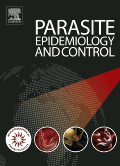
Parasite Epidemiology and Control
Scope & Guideline
Advancing knowledge to combat parasitic threats.
Introduction
Aims and Scopes
- Epidemiology of Parasitic Infections:
Research focusing on the distribution, determinants, and dynamics of parasitic infections in various populations, including humans and animals, across different geographical regions. - Control Strategies and Interventions:
Studies evaluating the effectiveness of various control strategies, including mass drug administration, vaccination, vector control, and community engagement initiatives aimed at reducing the prevalence of parasitic diseases. - Molecular and Genetic Studies:
Research involving molecular techniques to understand the genetic diversity and evolution of parasites, which can inform control strategies and improve diagnostic methods. - Public Health Impact:
Investigations into the socio-economic and health impacts of parasitic infections, including morbidity, mortality, and the burden on healthcare systems. - Zoonotic and Vector-Borne Diseases:
Research addressing parasitic diseases that are transmitted from animals to humans, including studies on vectors that facilitate the spread of these infections.
Trending and Emerging
- Impact of Climate Change on Parasitic Diseases:
Research exploring how climate variability affects the transmission dynamics of parasitic diseases is on the rise, highlighting the need for adaptive strategies in response to changing environmental conditions. - Integration of Technology in Parasitology:
Emerging themes include the use of artificial intelligence and IoT technologies for monitoring and controlling parasitic diseases, indicating a trend towards innovative solutions in epidemiological research. - Multi-Pathogen Interactions:
Studies examining co-infections, particularly the interactions between parasitic and viral infections (e.g., COVID-19 and malaria), are gaining prominence, reflecting an urgent need to understand the complexities of disease interactions. - Community-Based Health Interventions:
Research focusing on community engagement and participatory approaches to health interventions is increasing, emphasizing the role of local populations in managing and controlling parasitic diseases. - Systematic Reviews and Meta-Analyses:
There is a notable increase in systematic reviews and meta-analyses, reflecting a growing emphasis on synthesizing existing research to inform evidence-based practices and guidelines for public health.
Declining or Waning
- Environmental and Ecological Studies:
Research that previously emphasized the ecological aspects of parasitic infections, such as habitat modeling and environmental impact assessments, has decreased, possibly due to a shift towards more immediate public health concerns. - Traditional Control Methods:
Studies focusing on traditional control methods, such as the use of herbal remedies or conventional pesticides, appear to be waning as researchers increasingly prioritize innovative and evidence-based approaches. - Localized Case Studies:
Detailed case studies focusing on specific local outbreaks or infections are becoming less common, possibly as the journal emphasizes broader epidemiological trends and meta-analyses that provide a global perspective.
Similar Journals

ISRAEL JOURNAL OF VETERINARY MEDICINE
Pioneering Research in Veterinary Medicine and Animal CareThe Israel Journal of Veterinary Medicine, published by the Israel Veterinary Medical Association, serves as a vital resource for researchers, professionals, and students in the fields of veterinary medicine and animal science. With a commitment to advancing knowledge across diverse veterinary disciplines, this journal plays a crucial role in disseminating significant findings and innovations that influence both local and global veterinary practices. Although it currently holds a Q4 ranking in both the Animal Science and Zoology and Veterinary (miscellaneous) categories, the journal's open access policy, enabling free availability of articles, aspires to increase its accessibility and engagement among the academic community. The journal's convergence of research from 2007 to 2024 showcases its dedication to continuously contributing to the evolving landscape of veterinary science.
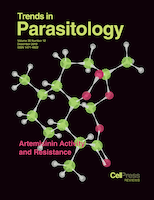
TRENDS IN PARASITOLOGY
Advancing the frontiers of parasitology research.TRENDS IN PARASITOLOGY is a premier academic journal published by CELL PRESS, focusing on the dynamic field of parasitology and infectious diseases. With an ISSN of 1471-4922, this esteemed journal is recognized for its high impact within the research community, boasting a Q1 ranking in both the Infectious Diseases and Parasitology categories as of 2023. This places it among the top-tier journals in the field, as evidenced by its remarkable Scopus rankings, where it ranks #3 out of 79 in Parasitology and #29 out of 344 in Infectious Diseases. Spanning over two decades of scholarly contributions from 2001 to 2024, TRENDS IN PARASITOLOGY emphasizes the latest advancements, challenges, and innovative methodologies in parasitology, making it an invaluable resource for researchers, healthcare professionals, and students alike. With an increasing focus on open access initiatives, this journal not only promotes widespread dissemination of knowledge but also encourages collaboration across the global scientific community. Whether you are investigating novel interventions, exploring parasite evolution, or understanding host-pathogen interactions, TRENDS IN PARASITOLOGY remains at the forefront of research, driving forward the understanding of parasitic diseases.

PARASITOLOGY RESEARCH
Advancing the frontiers of parasitology research.PARASITOLOGY RESEARCH, published by Springer, stands as a pivotal journal in the fields of parasitology, infectious diseases, and insect science, with a rich history dating back to 1987. Operating from Germany, this journal has garnered an impressive reputation, achieving a high ranking within various categories, including Q1 in Veterinary (miscellaneous) and Q2 across several relevant fields as of 2023. While it does not currently offer Open Access options, the journal remains a vital resource for researchers, professionals, and students seeking to contribute to and keep pace with advancements in parasitological studies. With a commitment to publishing high-quality research, PARASITOLOGY RESEARCH serves as an essential forum for disseminating findings that enhance our understanding of parasitic organisms and their impacts on health and the environment. Explore this journal to engage with cutting-edge investigations and reviews that drive innovation in parasitology and related disciplines.
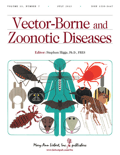
VECTOR-BORNE AND ZOONOTIC DISEASES
Unveiling insights into the world of infectious pathogens.VECTOR-BORNE AND ZOONOTIC DISEASES is a prominent journal dedicated to advancing research in the fields of infectious diseases, microbiology, and virology, published by Mary Ann Liebert, Inc. With a rich history spanning from 2001 to 2024, this journal plays a critical role in disseminating cutting-edge research and insights regarding diseases transmitted by vectors and zoonotic pathogens. It has achieved notable rankings, including Q2 in the Infectious Diseases category and Q3 in both Microbiology and Virology as of 2023. The journal's emphasis on quality and relevance is further underscored by its established position—ranked 151st in Infectious Diseases and within the 43rd percentile in Virology according to Scopus. Although not an open-access journal, the publication ensures that its findings reach a broad audience of researchers, professionals, and students dedicated to tackling the challenges posed by these critical health issues. By providing a platform for innovative studies and discussions, VECTOR-BORNE AND ZOONOTIC DISEASES remains an essential resource for those at the forefront of disease research and public health strategies.

JOURNAL OF VECTOR BORNE DISEASES
Transforming insights into action against vector-borne diseases.JOURNAL OF VECTOR BORNE DISEASES, published by Wolters Kluwer Medknow Publications, is an esteemed peer-reviewed journal dedicated to advancing the understanding of vector-borne diseases, a significant concern in global health. Established in 2003, this open-access journal has fostered a rich repository of research, spanning clinical studies, epidemiology, and control strategies related to diseases transmitted by vectors like mosquitoes and ticks. With its impact continuing to grow, as evident from its Q3 quartile rankings in Infectious Diseases and Medicine (miscellaneous) categories in 2023, the journal provides a critical platform for researchers and healthcare professionals to disseminate findings that inform policy and practice. With the aim of highlighting contemporary issues and innovations in the field, it is vital for ongoing discussions and advancements in vector-borne disease management. Evaluation metrics from Scopus, although currently positioned in the lower percentiles, underscore the journal's importance as an emerging source of scholarly information in parasitology and immunology. By adhering to its open-access model since 2012, the journal ensures that its valuable content is readily accessible, facilitating widespread knowledge transfer and collaboration among scholars and practitioners alike.
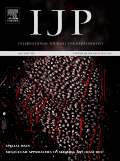
INTERNATIONAL JOURNAL FOR PARASITOLOGY
Advancing the Frontiers of Parasitology ResearchInternational Journal for Parasitology, published by Elsevier Sci Ltd, stands as a premier platform for disseminating groundbreaking research in the fields of parasitology and infectious diseases. With an impressive impact factor represented by its Q1 quartile rankings in both Infectious Diseases and Parasitology for 2023, this journal commands significant attention within the scientific community. Operating since 1971, it has profoundly contributed to the understanding of parasitic infections and their implications for human health, occupying a distinguished position ranked #7 out of 79 in Parasitology and #64 out of 344 in Infectious Diseases according to Scopus metrics. Although the journal currently does not offer open access options, it ensures rigorous peer review and unparalleled academic integrity, providing researchers, professionals, and students with critical insights necessary for advancing knowledge and fostering innovations in parasitology. Together with its rich historical foundation and commitment to excellence, the journal is indispensable for anyone delving into the complexities of parasites and their impact on both host and ecosystem.

ACTA PARASITOLOGICA
Pioneering Pathways in Parasitology StudiesACTA PARASITOLOGICA, published by SPRINGER INT PUBL AG, stands as a pivotal journal within the field of Parasitology, boasting an ISSN of 1230-2821 and an E-ISSN of 1896-1851. Based in Germany, it has been providing valuable insights and research contributions since its inception, with publishing years converging from 1992 to 1994 and consistently from 1996 to 2024. The journal is recognized in the 2023 Category Quartiles as Q3 in Parasitology, indicating its significant impact and growing influence in the discipline, reflected in its Rank #43/79 in the Scopus Ranks for Immunology and Microbiology (Parasitology). Although not currently available in an Open Access format, ACTA PARASITOLOGICA remains a critical resource for researchers, professionals, and students alike, serving as a platform for the latest developments, methodologies, and discoveries in parasitic research. Its ongoing commitment to advancing the understanding of parasitic diseases and their impact on health and ecosystems underscores its importance in both academia and public health.

ACTA TROPICA
Elevating Standards in Tropical Research ExcellenceACTA TROPICA is a prestigious academic journal published by Elsevier, dedicated to advancing knowledge in the fields of Infectious Diseases, Insect Science, Parasitology, and Veterinary sciences. With an ISSN of 0001-706X and an E-ISSN of 1873-6254, it has established itself as a vital resource since its inception in 1945. The journal is recognized for its significant impact within the scientific community, boasting a Q2 ranking in Infectious Diseases and Parasitology, and a Q1 ranking in both Insect Science and Veterinary (miscellaneous) categories as of 2023. Specifically, it ranks #19 in Scopus for Parasitology and #129 for Infectious Diseases, underscoring its high visibility and relevance in these vital research arenas. ACTA TROPICA is a non-open access journal, ensuring high-quality peer-reviewed content that complements ongoing research and professional practices among scientists, researchers, and students. Explore groundbreaking studies and contribute to the ongoing dialogue within your field by selecting ACTA TROPICA as your next publication destination.
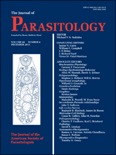
JOURNAL OF PARASITOLOGY
Connecting Researchers to the Heart of ParasitologyJOURNAL OF PARASITOLOGY is a leading scholarly publication dedicated to the field of parasitology, published by ALLEN PRESS INC. With an impactful history spanning from 1945 to 2024, this journal serves as a vital resource for researchers, professionals, and students interested in the complex interactions between parasites and their hosts. Operating from its base in the United States, this journal holds a Scopus quartile ranking of Q3 in Ecology, Evolution, Behavior and Systematics, Medicine (Miscellaneous), and Parasitology, providing a solid reflection of its impact within these categories. While currently not offering Open Access, the JOURNAL OF PARASITOLOGY continues to encourage the dissemination of pivotal research findings that contribute to our understanding of parasitic diseases and ecological systems, positioning it as an indispensable tool for knowledge advancement in the life sciences.
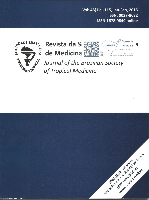
Revista da Sociedade Brasileira de Medicina Tropical
Connecting research to global health solutions.Revista da Sociedade Brasileira de Medicina Tropical is a distinguished open-access journal published by the Sociedade Brasileira de Medicina Tropical, focusing on the critical fields of Infectious Diseases, Microbiology, and Parasitology. Since its inception in 1972, this journal has committed to disseminating impactful research that addresses pressing global health challenges, particularly in tropical and infectious diseases prevalent in Brazil and beyond. With a robust publication history, it has been recognized as a Q3 journal in esteemed categories, reflecting its valuable contributions to scientific literature and its ranking in various Scopus categories, including a notable position in Parasitology. Researchers, professionals, and students are encouraged to engage with its rich repository of research, which has been freely accessible since 1997, fostering a wide-reaching impact on public health strategy and scientific innovation.